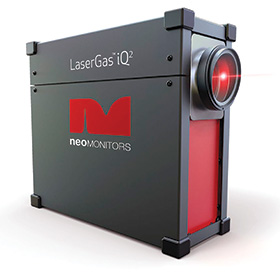

RTS Africa Technologies (RTS) is a specialised Tshwane-based company focused on supplying engineered solutions to problems experienced by process engineers in industry.
There is now a serious problem in industry with harmful emissions from process plants – particularly in applications such as refineries and power generation. A significant component in controlling emissions is to ensure that combustion processes are efficient. In order to achieve this, it is necessary to ensure that air is fed into the process in the correct proportion to the combustible products present. Unfortunately, most of the problems encountered in controlling combustion processes are due to inadequate control of the air mixture entering the process. Control of these combustion processes is essential, not only to reduce polluting emissions, but also to optimise fuel efficiency, which can have a significant effect on reducing costs.
Oxygen content
While it is not the only gas component critical to this process, a primary indicator of incorrect combustion mixtures is the oxygen remaining in the flue gas. In theory, in a perfect combustion process, there would be no oxygen remaining in the flue gas. In practice, a significant reduction in noxious emissions can be achieved by controlling oxygen content in the flue gas to below at worst 4% and preferably to below 2%. In practice, we regularly measure oxygen content in flue gases at over 12%. (Note: there are other indicators of combustion efficiencies, such as carbon dioxide and carbon monoxide content in the flue gas.)
The reason for this is that in most combustion processes an operator will go out on the plant and take a spot measurement of (say) oxygen. He will then manually adjust the air registers until he gets a good (low) oxygen reading. He goes away and probably will not recheck anything for up to a week or more. In the meantime, the combustion process is not static but is affected by changes in the feed stock to the burner, and also by changes in the air feed that can be caused by alterations in atmospheric pressure, impact of strong winds, etc.
Elimination of these problems requires accurate and reliable instrumentation and control systems. Over the years RTS has assembled a portfolio of tried and tested technologies that offer cost-effective solutions to these problems.
Neo Monitors
RTS has represented Neo Monitors for nearly two decades. Neo Monitors is a Norwegian company that pioneered the application of laser technology to gas analysis. Note that the LaserGas Analyser can measure a wide range of gases that may be present in combustion off-gas. The analysers have no probes and are capable of measuring a selection of one, and in some cases two, gases (carbon dioxide and carbon monoxide for instance) in a soup of hydrocarbon and other gases. The instrument is tuned to detect a specific absorption line for the gas to be measured. It detects only the selected absorption line and is ‘blind’ to any other gases that may be present. There is therefore no possible cross interference from other gases. Installation of a single Neo Monitors LaserGas oxygen analyser on the stack with a PID control system to automatically control the air registers can provide constant regulation of the combustion process in real time.
All NEO Monitors instruments are built in Norway to a high quality standard and provide many years of accurate and reliable service.
| Email: | [email protected] |
| www: | www.rtsafrica.co.za |
| Articles: | More information and articles about RTS Africa Engineering |

© Technews Publishing (Pty) Ltd | All Rights Reserved